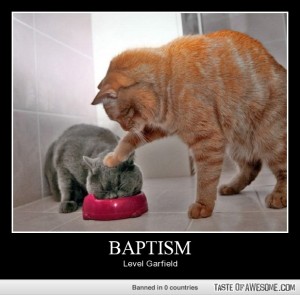Blog Archives
A VERSE TO REMEMBER:
“We have our hope set on the living God, who is the Savior of all people, especially of those who believe” (1Tim 4.10).
We can read this verse two primary ways (though there could be others): Jesus’ death justified the sins of all people (Arminian) or “all people” means only “those who believe” (Calvinist). One view emphasizes the fact that Jesus died for the sins of all (2Cor 5.21), while the other believes His sacrifice is imputed only to those who believe it to be true. But we must ask the question: is something true only because we believe it is or does a truth only affect us when we place our faith in it? Gravity is true apart from faith but faith in it keeps one grounded in reality.
DON’T BELIEVE THE SIMPLE GOSPEL (Part 7)
Practically Sanctified – Repent… and be saved
Is repentance required for salvation?
 “Unless you repent, you will all likewise perish” (Luk 13.3). Peter said, “Repent, then and turn to God, so that your sins may be wiped out” (Acts 3.19). Paul writes, “Godly sorrow brings repentance that leads to salvation and leaves no regret” (2Cor 7.10). If these verses are correct, then repentance most assuredly is required for salvation.
“Unless you repent, you will all likewise perish” (Luk 13.3). Peter said, “Repent, then and turn to God, so that your sins may be wiped out” (Acts 3.19). Paul writes, “Godly sorrow brings repentance that leads to salvation and leaves no regret” (2Cor 7.10). If these verses are correct, then repentance most assuredly is required for salvation.
Most Christians define “repentance” by adding to the dictionary’s definition—“a feeling of regret about one’s sins—“the action: “and turning from it.” Which raises the question:
Is repentance something I do (a work) or something God does in me (a gift)?
We previously discussed how faith is a work we do and not a gift granted by God; however, faith is empowered by the gift of grace we receive from God and by the indwelling of the Holy Spirit who becomes our “ears so we can hear.” Think about grace like a power source and faith like the power cord that has no “power” unless it is plugged into the source. Faith without works is dead because faith is a work dependent upon a gift, just as breathing is dependent upon God’s gift of life. So faith is a work we can do only because of what God has done through His grace (Rom 3.24).
Similarly, to repent of one’s sins is something we must do. According to the “five step plan of repentance,” one must be honest about sin, acknowledge it, confess it, “hide in God,” and know you are forgiven. All of which sound to me like something I do—a work. Which should make us ask this question:
If repentance is a work, and is also required for salvation, then am I saved by works?
On the other hand, if, as Oswald Chambers says, “Strictly speaking, a person cannot repent when he chooses—repentance is a gift of God,” then why do we still struggle against sin as John and Paul argue we must (1John 1.8-10; Rom 7.17, 18)? If we are gifted repentance, then why not wait until God “makes me feel sorry and turn from my sins?” Which raises this question:
If repentance is a gift—something God does—and we continue to sin; does it mean that we have not repented and therefore are not saved?
“Repentance, properly defined, is necessary for salvation. Biblical repentance is changing your mind about your sin—no longer is sin something to toy with; it is something to be forsaken as we “flee from the coming wrath” (Matthew 3:7). It is also changing your mind about Jesus Christ—no longer is He to be mocked, discounted, or ignored; He is the Savior to be clung to; He is the Lord to be worshiped and adored” (https://www.gotquestions.org/repentance.html).
 The problem is our definition of repentance. The Greek work for “repent” is “metanoia,” which means “a change of mind” and not “regret” or “turning from sin.” And it makes sense if you think about it. Consider if I flicked boogers at you and you told me to stop and when I wouldn’t, you threatened to shoot me in the face. So I stop, but when you no longer have the gun I start flicking them again—have I repented? No, but what if you convinced me that I should consider you better than myself and do to you as I would have done to me—in essence, changed my mind? If I stop then, would I not have truly repented?
The problem is our definition of repentance. The Greek work for “repent” is “metanoia,” which means “a change of mind” and not “regret” or “turning from sin.” And it makes sense if you think about it. Consider if I flicked boogers at you and you told me to stop and when I wouldn’t, you threatened to shoot me in the face. So I stop, but when you no longer have the gun I start flicking them again—have I repented? No, but what if you convinced me that I should consider you better than myself and do to you as I would have done to me—in essence, changed my mind? If I stop then, would I not have truly repented?
Does God change minds?
God literally changes our minds by giving us His. Paul writes, “For who among men knows the thoughts of a man except the man’s spirit within him. In the same way no one knows the thoughts of God except the Spirit of God. We have received… the Spirit who is from God, that we may understand what God has feely given us…. We have the mind of Christ” (1Cor 2.9-16). God changes our minds by giving us His.
This is why Paul advises Tim not to “quarrel,” instead hoping that “God will grant them repentance leading to a knowledge of the truth” (2Tim 2.24, 25)—Paul implies that God alone changes minds, not our arguments. Yet it is through our “teaching” that the need for repentance is recognized.
Why should God’s gift or repentance affect my sinful practices?
 The problem with repentance is that we typically define the word by what it causes and not what it is. Like how we define love as “being nice” or “giving hugs” or “sharing joy,” when it really means (biblically, that is) “sacrifice” (1John 4.10). Love causes those actions and feelings but should not be defined by them. The same is true with repentance—it’s a change of mind that will, inevitably, result in us turning from sin to God and His righteousness.
The problem with repentance is that we typically define the word by what it causes and not what it is. Like how we define love as “being nice” or “giving hugs” or “sharing joy,” when it really means (biblically, that is) “sacrifice” (1John 4.10). Love causes those actions and feelings but should not be defined by them. The same is true with repentance—it’s a change of mind that will, inevitably, result in us turning from sin to God and His righteousness.
If grace is the power source to faith’s power cord, then repentance is the electricity. Hand-in-hand, like two sides of the same coin, faith and repentance are our practical applications of God’s sanctifying work—how we, through His gifts, become holy even as He is holy.
“The time is at hand… repent and believe in the gospel” (Mark 1.15).
Hearing God
 A few friends have struggled with hearing God in the midst of their mental quagmires and though they didn’t specifically ask for my counsel, I figured I’d offer it as one who also asks, “Does God speak even when I’m not listening?”
A few friends have struggled with hearing God in the midst of their mental quagmires and though they didn’t specifically ask for my counsel, I figured I’d offer it as one who also asks, “Does God speak even when I’m not listening?”
I’ve discovered that God uses 4 methods for communicating His thoughts: the written counsel of His prophets and apostles we call His Word, spoken counsel provided by not only His devoted servants but even by those who are like Balaam’s ass, our own conscience thought convicting us to turn from evil and cling to what is good, and circumstances in our daily lives that are like wordless guidepost on the path of wisdom. God requires faith to hear Him speak as we hope that what we hear is actually what He desires.
 Scripture is the “no duh” of hearing God speak; however, it is also the least likely used by Christians to hear from God because it requires far greater faith… and study. Actually, Paul tells us that faith derives from hearing God’s Word (Rom 10.17) because faith is being persuaded that the One who speaks will keep the promises He’s made. Paul tells us, “Everything that was written in the past was written to teach us” (Rom 15.4), meaning it was written for us, but not to us. We study the Bible because we believe they are the literal Words of God and that the only way we can hear His voice for ourselves is to study what others have already heard.
Scripture is the “no duh” of hearing God speak; however, it is also the least likely used by Christians to hear from God because it requires far greater faith… and study. Actually, Paul tells us that faith derives from hearing God’s Word (Rom 10.17) because faith is being persuaded that the One who speaks will keep the promises He’s made. Paul tells us, “Everything that was written in the past was written to teach us” (Rom 15.4), meaning it was written for us, but not to us. We study the Bible because we believe they are the literal Words of God and that the only way we can hear His voice for ourselves is to study what others have already heard.
 God consistently sent prophets to His people consisting of both righteous servants like Isaiah, Jeremiah, and Ezekiel and even worldly advisors like Balaam, Solomon, and those He sent to test their love (Deut 13.1-3). Some are gifted with hearing from God and teaching us to understand and hear His voice, while others teach exactly what we pay to hear, and then there are those whose voices are as deceptive as fallen angels. Discernment is the key as we learn to listen to God’s small whisper even when it’s muffled by the chaotic dissonance of the world. Assuming God speaks to us without the counsel of His chosen is as dumb as believing God only speaks to us through the counsel of His chosen.
God consistently sent prophets to His people consisting of both righteous servants like Isaiah, Jeremiah, and Ezekiel and even worldly advisors like Balaam, Solomon, and those He sent to test their love (Deut 13.1-3). Some are gifted with hearing from God and teaching us to understand and hear His voice, while others teach exactly what we pay to hear, and then there are those whose voices are as deceptive as fallen angels. Discernment is the key as we learn to listen to God’s small whisper even when it’s muffled by the chaotic dissonance of the world. Assuming God speaks to us without the counsel of His chosen is as dumb as believing God only speaks to us through the counsel of His chosen.
 Literally hearing God’s audible voice is a claim few should make; however, those who do, often hear God speaking in their own voice through the thoughts of their mind. The conscience—Greek “suneidesis”—means “joint-knowledge,” or a God-given capacity to comprehend right from wrong. That is, we are born with an “instinctive” connection to God with His “law written [on our] hearts,” so that our consciences might bear witness before God of our devotion to Him despite our lack of education about Him (Rom 2.13-16). Therefore, our sub-conscience thoughts can remind us of God’s desires, but as is often the case, many of us have “seared our own conscience” (1Tim 4.2) so that what we hear isn’t God’s voice but rather our voice claiming to be God’s.
Literally hearing God’s audible voice is a claim few should make; however, those who do, often hear God speaking in their own voice through the thoughts of their mind. The conscience—Greek “suneidesis”—means “joint-knowledge,” or a God-given capacity to comprehend right from wrong. That is, we are born with an “instinctive” connection to God with His “law written [on our] hearts,” so that our consciences might bear witness before God of our devotion to Him despite our lack of education about Him (Rom 2.13-16). Therefore, our sub-conscience thoughts can remind us of God’s desires, but as is often the case, many of us have “seared our own conscience” (1Tim 4.2) so that what we hear isn’t God’s voice but rather our voice claiming to be God’s.
 For many, life’s circumstances serve as “signs” to foretell God’s will in their lives. Like how Jonathan said that if the Philistines told him to come up it to battle it would be a sign from God that he would have victory (1Sam 14) or how we think that if our stomach grumbles, God must want us to buy that $50 steak. Although signs could be God’s inaudible way of testing our wisdom, like a dove landing on a carpenter, it could also simply be happenstance like a “random” arrow prophetically killing a king (2Chr 18.33). Jesus says the “wicked” and “adulterous” seek signs (Mt 12.39) because circumstances can be interpreted to mean whatever we wish to be true. We never hear His voice through “signs,” but if we are look closely, we can sometimes see the movement of His will.
For many, life’s circumstances serve as “signs” to foretell God’s will in their lives. Like how Jonathan said that if the Philistines told him to come up it to battle it would be a sign from God that he would have victory (1Sam 14) or how we think that if our stomach grumbles, God must want us to buy that $50 steak. Although signs could be God’s inaudible way of testing our wisdom, like a dove landing on a carpenter, it could also simply be happenstance like a “random” arrow prophetically killing a king (2Chr 18.33). Jesus says the “wicked” and “adulterous” seek signs (Mt 12.39) because circumstances can be interpreted to mean whatever we wish to be true. We never hear His voice through “signs,” but if we are look closely, we can sometimes see the movement of His will.
Christians believe it takes a lot of faith to hear God speak through “signs,” but in reality, that’s actually “hope,” unless God promises to provide you a sign before He fulfills His promises. Faith is being “fully persuaded that God has the power to do what He has promised” (Rom 4.20,21) and it comes from hearing His Word. Hope is a desire for the unseen, a longing for what we wish, not trust in what God specifically wills. Hearing God requires us to listen to what we know are His words so that we might discern Him speaking through that which isn’t as clear.
God promises, “Whether you turn to the right or to the left, your ears will hear a voice behind you saying, ‘This is the way; walk in it” (Isa 30.21). Often that “voice” will be the written Word of God, sometimes the voice of an advisor, the thoughts of our conscience, or even signs we hope represent God’s direction.
His promise is to speak: it takes our faith to listen.
IS CHURCH MEMBERSHIP BIBLICAL? (5 of 5)
 “Go and make disciples”
“Go and make disciples”
We all know the great commission; however, here’s something to consider: Is Jesus’ commission given to “the church” or the individual Christian? That is, do we make disciples within the confines of a sanctuary and under the auspices of clergy or is Jesus commanding every individual member of Christ’s body to go and make disciples?
If we say Jesus commands only the clergy to make disciples, then we’ll have to consider if Jesus only commands pastors to “be witnesses” (Acts 1.8), “preach the Word” (2Tim 4.1), “love one another” (John 13.34) and “do good” (Gal 6.10). God commands us all to be witnesses, preach the Word, love one another, do good, AND make disciples. It’s not a congregational commission but an individual initiative.
What did Jesus do?
If Jesus individually commissions us to make disciples then should we engage in discipleship individually or communally? That is, should we make disciples congregationally (large group classes) or individually (one-on-one or one-on-two to three)?
Let’s ask another question: are we making disciples of Jesus or of [insert name, group, or denomination] here? If we make disciples congregationally, then how are we exemplifying a personal relationship with Jesus Christ? How does 1 provide accountability for 200? What covenant are we promoting when discipleship only occurs within the confines of a brick and mortar “temple?”
You can count on one hand the number of times Jesus required church membership. Actually, such a list would’ve been a death warrant shortly after His resurrection because Jesus NEVER required what we call essential.
“Teach them to obey everything I commanded you”
Instead, His disciples taught others as they were trained by Him. Jesus began His ministry with two of John the Baptist’s disciples who later invited their biological brothers to join the fellowship (John 1.35-42). One of those brothers was Peter, of whom Jesus said, “Blessed are you… for this was not revealed to you by man, but by my Father…. You are Peter, and on this rock I will build my church” (Mt 16.17-19). In other words, what Jesus did for Peter is the foundation upon which the Church is built, not the old covenant church confined by walls and run by priests, but the new covenant church Peter understood all too well.
Peter writes to those he discipled, “You also, like living stones, are being built into a spiritual house to be a holy priesthood, offering spiritual sacrifices acceptable to God through Jesus Christ” (1Pt 2.4-5). No other verse so succinctly summarizes the message of the New Covenant than Peter, Jesus’ rock, does here. Peter’s revelation came directly from God, not man, and his relationship was personal, not congregational.
The question:
Is the requirement for church membership biblical? Jesus told His disciples a parable about how only old wineskins can contain old wine, and new wineskins only new wine. He ended this parable with this remark: “No one after drinking the old wine wants the new, for he says, ‘The old is better.’
If our definition of “church” is old covenant, then we won’t like the taste of the new. If you are a member of the New Covenant Church then a requirement to join the old covenant will seem quite unbiblical.
IS CHURCH MEMBERSHIP BIBLICAL? (1 of 5)
One of my “pet peeves” about congregational gatherings is the dogmatic push for church membership. Maybe it’s because I spiritually “grew up” in parachurch groups and military chapel systems where membership was implied through consistent attendance and not complicit acceptance of denominational doctrine. Sure, I understand that church membership is of great logistical importance to modern congregations and that for some, belonging to a fellowship necessitates formalities. However, when church membership becomes a requirement it mutates into something more than a mere convenience.
What is “Church?”
We all know that “Church” is not a where, but a whom; not an edifice but an edifying body of believers building one another up in Christ. All Christians also understand that we belong to the universal body of Christ not when we sign a paper, but because we are adopted as His sons and daughters through the indwelling of His Spirit (Gal 4.6). So why do some believe a pledge of allegiance to an organization is required?
An article on gospelcoalition.org about the requirement for church membership stated, “being a part of the universal church without submitting to a local church is not possible, biblical, or healthy…. Every letter in the New Testament assumes Christians are members of local churches…. Independence—the desire to choose for yourself what’s right and wrong—is at the heart of sin. You need the humility lesson of submitting to flawed elders” (http://www.thegospelcoalition.org/article/is-church-membership-really-required).
Old or New Covenant?
Most Christians define “church” similar to what the Gospel Coalition and other denominational organizations do: a local congregation led by an ordained elder or pastor, meeting in a sanctified edifice, and consisting of a laity who gives and serves separate from a clergy who shepherds and preaches. This construct is what the Bible calls “the old covenant” with the expectation that anyone who is following Jesus will comprehend, adhere to, and inevitably become a member of the new covenant.
The old covenant requires our dependence upon an appointed, ordained, and educated priest, prophet, pope, or pastor. The new covenant states, “none of them shall teach his neighbor, and none his brother” (Heb 8.10) imploring us ALL to mature to teachers, not babies dependent upon the milk of others’ knowledge (Heb 5.11-14).
The old covenant “had ordinances of divine service and the earthly sanctuary” (Heb 9.1) requiring “church” to be housed in a sanctified facility. The new covenant says “for where two or three come together in my name,” there is Church—whether where we come together is a home, a restaurant, or a park (Mt 18.20). Old covenant church is a where and when; new covenant is who and why.
The old covenant requires the priest to complete a duty dissimilar to the laity. The new covenant teaches that we are all priests (1Pt 2.9), called to ministry (2Cor 5.17-20), and required to do “our part” as a member of Christ’s Body (Eph 4.16).
Therefore, the question we must ask is this: are you becoming a member of the old or new covenant?
THE FALSE TEACHER TEST (8)
8) Am I a false teacher if I believe and teach what is false?
Blind Spots
“If you were blind, you would not be guilty of sin; but now that you claim you can see, your guilt remains” (John 9.41). Because all of us are born and bred sinners, we will continue to sin by speaking what is false, disobeying what is commanded, and living contrary to God’s Word. False teachers claim to be free from their own blindness, which is why John writes, “If we claim to be without sin, we deceive ourselves and the truth is not in us…. We make [God] out to be a liar and his word has no place in our lives” (1John 1.8, 10). The very first sin, and I would argue the definition of it, was a desire to become “god” to ourselves, to close our eyes to the commands of another Lord so that we might become our own: to make God a liar, and we the only source of truth.
Identifying blind spots requires “daily” assistance from those who “encourage” us by accounting for hearts prone to being “hardened by sin’s deceitfulness” (Heb 3.13). These blind spots redirect our eyes from God’s stated truths to what our hearts “feel” is true.
- SIN distorts God’s Word by turning our application of its principles into a “license to sin” (Jude 4).
- Immaturity focuses our attention upon ourselves, transforming God’s Word into a pacifier that appeases our whims.
- Traditions revise God’s Word, altering our understanding of His commands until we define our beliefs as His Word.
Spotting these impairments to our sight will keep us from becoming blinded by the blinders of the false teachers.
Blinders
Blinders narrow one’s view until we see only what others or we wish to perceive. False teachers use our blind spots to blind us to God’s Word by implanting within our minds apparitions of truth that are like waterless clouds and hallowed promises.
- Money blinds the sight of both the giver and the one motivated by gain until we see and preach only what appeals to our selfish ambitions
- Popularity’s applause is like Pavlovian conditioning, turning our hearts, minds, and doctrines to whatever brings the praise of people.
- Signs are “faith insurance” sold by Bible proselytizers who implore us to believe our faith resides upon the traditions they sell rather than the words God speaks.
False teachers are not only blinded by their own blind spots, they place blinders on the sinful, immature, and traditions-minded who follow them. The actual “blind leading the blind.”
Preventing Blindness
Because we all struggle with sin, immaturity, and traditions, we will indubitably believe and teach what is false. However, that doesn’t make us false teachers. Peter and Paul are two great examples:
Years after God taught Peter that Gentiles were equal to Jews (Acts 10), Paul chastised the apostle for mistreating Gentile believers, “I opposed him to his face, because he was clearly in the wrong” (Gal 2.11). Peter believed, taught, and lived what was false but who would ever consider him a false teacher? James sent Barnabas and Paul to the Gentiles to teach that all believers should “abstain from things offered to idols” (Act 15.29). Paul accepted the charge, yet preached opposite of what was advised, “We are no worse if we do not eat, and no better if we do” (1Cor 8.8). Either Paul sinned by lying when he accepted James’ instructions or he later matured when he taught the opposite to the Corinthians, but the obvious should still be stated: Paul was not a false teacher though he had believed, taught, or acted in a false manner.
“Scripture is useful for teaching, rebuking, correcting, and training in righteousness” (2Tim 3.16). The purpose of God’s Word is to rebuke and correct us when we speak what is false. The challenge is in accepting rebuke and correction by recognizing that what we believe and speak is false. The inability to do so is what trains false teachers.
THE FALSE TEACHER TEST (7)
7) What definition of faith do false teachers “sell?”
Third Blinder- Seeking Signs
False teachers exploit the blinds spots our traditions create by incrementally altering the Word to say what we want so that we can no longer hear what it says. They preach blinders represented by tangible “signs” that validate our “experience,” making us “feel” God “moving in our hearts” slowly training us to place our trust in what we can see, hear, and experience rather than in the words of an invisible God. Jesus says, “An evil and adulterous generation craves for a sign” (Mt 12.39) by placing their trust in what they see, feel, or hear rather than in the promises of God. Those who seek signs exchange eternal promises about faith, salvation, and obedience for “man-made” traditions like sinners’ prayers, water baptism, church structure, holy days, spiritual “feelings,” religious sacraments, melodic praise, and the such.
The Faith of Abraham
“Abraham believed God, and it was accounted to him for righteousness” (Gen 15.6). When Abe was 75, God promised the old man a child through his wife Sarai. Try as they might, Abe and Sarai could not bear children even though they believed God; therefore, they concocted an idea that perhaps the fulfillment of God’s promise required an “act of faith” beyond merely trusting a promise. At 86 years young, Abe slept with Sarai’s maidservant, Hagar, who bore him Ishmael, whose generations continually warred with the children of Isaac, the son God actually promised, who was born when Abe turned 100. Paul contrasts these two sons stating that Ishmael is a figurative representative of those “under the law,” who “act on faith” by attempting to affirm God’s promises through their actions, while “sons of promise,” “born by the power of the Spirit,” have a faith that derives from hearing God’s promises (Gal 4).
Is Faith Assurance or Insurance?
Abe’s faith in God resulted in two sons who represent two modern perceptions of faith, insurance and assurance. When Abe sought to fulfill God’s promise on his own terms (insurance), it resulted in Ishmael; however when his faith trusted in God’s promise (assurance), the result was Isaac. Assurance is reliance upon a promise not bound by law, like a parent who assures their child they will bail them out of jail. Insurance is a law-abiding agreement requiring payment from the insured and fulfillment of the agreement by the insurer, like car or life insurance. “Faith insurance” relies upon payments—confessions, ritualistic prayers, practice of sacraments, membership, tithes, etc.—and requires God, bound to His Law, to grant us forgiveness, salvation, prosperity, blessing, and any “good” we can imagine. Assurance of faith “comes from hearing” and relies only upon God’s faithfulness to keep His promises. We do nothing to gain assurance, we do everything to pay for insurance.
Selling Faith Insurance
“They mouth empty, boastful words and, by appealing to the lustful desires of sinful human nature, they entice people who are just escaping from those who live in error” (2Pt 2.18). False teachers sell us a “faith that works” ensuring us that if we don’t attain the objects of our desires, it’s because we didn’t have enough faith. Notice that the target of their preaching are Christians who “are just escaping… from error.” Infants in Christ are easily swayed by “every wind of doctrine” (Eph 4.13); therefore, false teachers implore them to say a prayer, get water baptized, buy a prayer cloth, speak in tongues, give to God till they get from God, and to “work out their salvation” by adhering to every man-made tradition the teachers validate.
“The work of Satan [is] displayed in all kinds of counterfeit miracles, SIGNS, and wonders, and in every sort of evil that deceives those who are perishing. They perish because they refuse to love the truth and so be saved. For this reason GOD sends them a powerful delusion so that they will believe the lie….” (2Thes 2.9-11). Faith insurance provides security as we cling to “powerful delusions” by placing faith in what we do (go to church), say (utter a prayer), or believe (I chose to be saved). False teachers want us to believe it is what we do that saves us, blesses us, and makes God loves us so that we will buy the faith insurance they sell. However, if our faith is ever in what we can see—validated by something we do—it is then that we know we are believing a lie.
Faith is Assurance in God’s Promises
Here’s the truth: “God chose you to be saved through the sanctifying work of the Spirit and through belief in the truth” (2Thes 2.13). This “belief in the truth” is simply assurance that God is faithful to keep His Word, not insurance paid incrementally through adherence to traditions and “works” that “earn” what we can never afford.
False teachers are motivated by money and the praise of people to sell us traditions that act as insurance for our faith.
YOU MIGHT BE A WATCHMAN IF… (3)
You are prepared
Someone asked me once why I believed the Lord would predetermine those who go to Heaven and Hell if He was a loving and gracious God. I wasn’t prepared for the question, so the answer I gave was as contradictory as a politician’s pre-election and post-election speech! Another time, I provided a snippet for an Operations Order and was questioned about the verbiage I had chosen. Not knowing how to explain why I worded it as I did, I said, “THEY told me to put that in there.” “They” often take the blame, but that should never work when it comes to God’s Word as the “they” are always “us.”
“Always be prepared to give an answer to everyone who ask you to give the reason for the hope that you have” (1Pt 3.15). Many of us feel convicted to speak when we hear something “not right,” like “Jesus isn’t God, water baptism saves you, choose God and He’ll choose you, that’s just my interpretation, gays are Christians too, and Christians shouldn’t judge,” but we don’t know how to defend our stance, so we remain silent. Abe Lincoln said, “Better to remain silent and thought a fool than to speak out and prove it.” Though that’s good wisdom, it’s really bad theology.
“Therefore, keep watch, because you do not know on what day or hour your Lord will come…. Be ready, because the son of Man will come… when you do not expect Him. Who is the faithful and wise servant, whom the master” finds doing as He commands? (Mt 24.42-46). Jesus often implores us to “be ready,” “keep watch,” and “be alert” for He will come with an expectation of a return for the talents He’s gifted us. Woe to him or her, who like the virgins who forgot their oil, will see the door shut because they were not prepared (Mt 25.10-13). A fool remains silent when he or she has the conviction and words to speak. A wise man holds his tongue when he has the conviction but is not prepared with the words. The watchman is prepared to speak when God’s Spirit convicts.
Paul’s advice to Timothy should be our own, “Be prepared in season and out of season” (2Tim 4.2). We do not know when our conviction will lead us to speak, but woe to us if we are not prepared to do so.
WHAT IS THE UNFORGIVABLE SIN?
“Every sin and blasphemy will be forgiven men, but the blasphemy against the Spirit will not be forgiven,” (Mt 12.31).
We should begin with what it is not.
- Some will argue that salvation comes by believing in Jesus Christ as your Lord and Savior. If this is true, then “unbelief” would be the unforgivable sin. That is, if I’m not saved because I don’t believe in Jesus, then unbelief is the only sin God will not forgive. If this is true, then wasn’t I committing an unforgiveable sin the entire time I didn’t believe in Jesus prior to the point that I actually did? In essence, I was committing the unforgivable sin of unbelief until I believed in Jesus and was forgiven.
- Not being baptized by water. Some argue that salvation occurs at the moment of immersion in water. If this is true, then not being baptized by water is the unforgiveable sin. Until one is immersed in water, they are committing an unforgiveable sin that is forgiven when they undergo the ceremony of water baptism.
You see the logical disconnect in each of these beliefs: God forgives the unforgiveable when we do something to change His mind about our condition. Unforgiveable means unforgiveable, not forgiven if you really mean it.
So what is the unforgiveable sin?
This “sin that leads to death” (1John 5.16), the Greek, “blasphemeo,” is also translated as “slander,” “dishonor,” or “malign,” which packs significance when we consider who it is that can do our name most harm through slander, dishonor or maligning. When strangers malign us, it’s not blasphemy because those who know us are not fooled. However, when those who know us dishonor our name, even strangers see us for fools. The only ones who can blaspheme God are those who claim to know Him, not those who do not call Him Lord.
God chastises the Jews by asking, “You who boast in the Law, through your breaking the Law, do you DISHONOR God? For ‘The Name of God is BLASPHEMED among the Gentiles because of you’” (Rom 2.23-24). Blasphemy occurs when those called the people of God “profane [His] holy name” (Ezek 36.20) by living contrary to His commands and “because of them the way of truth will be maligned [blasphemeo]” (2Pt 2.2). Jesus’ warning about blaspheming wasn’t given to nonbelievers who struggle with unbelief but to Pharisees, the spiritual leaders of His day, who were a “brood of vipers” and “hypocrites” who will “give an account on the day of judgment for every careless word” they’ve spoken (Mt 12.25-37). They were God’s teachers who believed and taught contrary to what God actually said.
So why is blasphemy against the Spirit unforgiveable? There exist only two impossibilities concerning God: “it is impossible for God to lie” and His Nature cannot change—He can’t stop being God (Heb 6.17-18). Blasphemy maligns God’s Word by turning it into a lie and presents God’s character contrarily to how He represents Himself in Scripture. When Moses hit the rock rather than speak to it, Uzzah stabilized the ark, or Herod didn’t deny being a deity, God could not forgive them because their actions maligned God’s character. Jesus said, “Things that cause people to sin are bound to come, but woe to that person through whom they come. It would be better for him to be thrown into the sea… than for him to cause one of these little ones to sin.” God cannot change; therefore, He cannot forgive those who try to change His Word or the representation of His character.
BAPTISM- IMMERSING OURSELVES IN CHRIST (part 1)
1- Why Water Baptism is Necessary for Salvation
Since moving to Utah, I have encountered many professing “Christ-believers” who endorse the doctrine of water baptism being either necessary for salvation or as a “first step of obedience” to Christ. None of them recognize that requiring a ceremony in order to affirm what only God can do is considered by a small portion of Bible-believing Christians like me to be synonymous with works. In essence, they are requiring works—actions performed by human beings—for salvation.
I recently discovered that one of my favorite bloggers, a popular Christian pastor and writer, believed that water baptism was necessary for salvation. After several attempts to reach him, he agreed to discuss with me why his belief was more biblically accurate than my own. I’ve taken the time to study what he wrote and then respond with anticipation for a continuing dialogue regarding this important topic.
I’m sharing what he and I write with my friends, asking that you might help me comprehend where my understanding has gone astray, any incongruities in his understanding of salvation, or whether my responses to him lack love, truth, respect, and Christ-likeness.
What follows in this part is his response to my question: Why do you believe water baptism is necessary for salvation?
“That’s a great question and one of my favorite discussions. There’s nothing I’d rather talk about than salvation in Christ Jesus!
Unfortunately, the position I hold on this issue has been taught (by many who attend churches of Christ) in such a way as to make it sound inconsistent with the overall gospel message. I wonder sometimes, as you do, if some of these folks – based on the way they talk about it – believe Jesus saves them or if they earn their salvation by having jumped in a pool of water.
Scripture seems very clear to me that sin separates mankind from God so that the sinner is an enemy of God (Romans 5:10), deserving death (Romans 6:23). But instead of slaying His enemies, God put to death His own Son, so that justice might be served AND that He might provide justification (Romans 3:26) for those who avail themselves to His offer of salvation.
The alien sinner has no right to ask anything from God. He has no right to expect an audience with God. He deserves only death and cannot expect God to even hear his prayers (Isaiah 59:2). The only way a person can be saved by God’s grace is to respond in humble, repentant faith to the gospel message and clothe himself with Christ (Galatians 3:26-27).
The moment that happens is the moment of baptism. Baptism is called:
* A burial with Christ (Romans 6)
* Being clothed with Christ (Galatians 3:26-27)
* An appeal to God for a clean conscience (1 Peter 3:21)
* The moment at which a person is “saved” (1 Peter 3:21)
* The moment at which sins are “forgiven” (Acts 2:38)
* The moment at which “the body of flesh” is done away with (Colossians 3:11-12)
In the book of Acts, we never even see someone as much as eat a piece of bread between believing the apostles’ testimony about Jesus and being baptized. To me that says a lot. To me, there is no question that a person is not “in Christ” until he has been immersed.”















